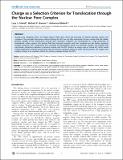Charge as a Selection Criterion for Translocation through the Nuclear Pore Complex
Author(s)
Colwell, Lucy J.; Brenner, Michael P.; Ribbeck, Katharina
DownloadRibbeck-2011-Charge as a Selection Criterion.pdf (1.549Mb)
PUBLISHER_CC
Publisher with Creative Commons License
Creative Commons Attribution
Terms of use
Metadata
Show full item recordAbstract
Nuclear pore complexes (NPCs) are highly selective filters that control the exchange of material between nucleus and cytoplasm. The principles that govern selective filtering by NPCs are not fully understood. Previous studies find that cellular proteins capable of fast translocation through NPCs (transport receptors) are characterized by a high proportion of hydrophobic surface regions. Our analysis finds that transport receptors and their complexes are also highly negatively charged. Moreover, NPC components that constitute the permeability barrier are positively charged. We estimate that electrostatic interactions between a transport receptor and the NPC result in an energy gain of several kBT, which would enable significantly increased translocation rates of transport receptors relative to other cellular proteins. We suggest that negative charge is an essential criterion for selective passage through the NPC.
Date issued
2010-04Department
Massachusetts Institute of Technology. Department of Biological EngineeringJournal
PloS Computational Biology
Publisher
Public Library of Science
Citation
Colwell, Lucy J., Brenner, Michael P., Ribbeck, Katharina. "Charge as a Selection Criterion for Translocation through the Nuclear Pore Complex." PLoS Comput Biol (2010) 6(4): e1000747.
Version: Final published version
ISSN
1553-7358
1553-734X